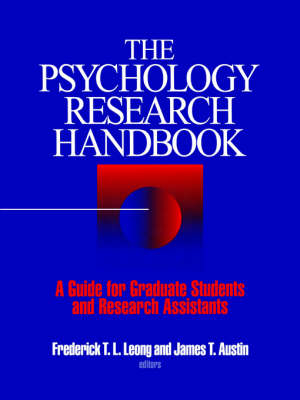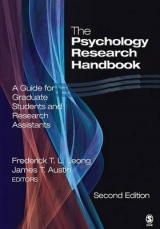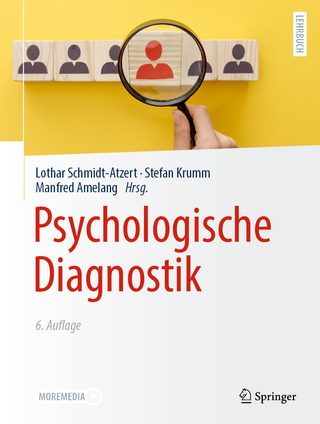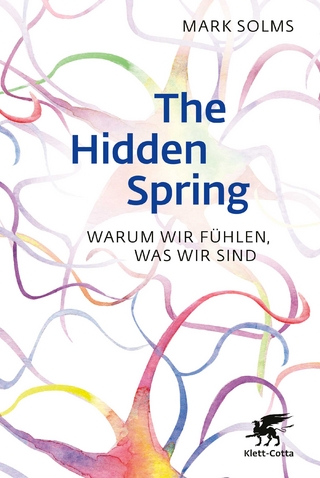
The Psychology Research Handbook
SAGE Publications Inc (Verlag)
978-0-8039-7049-6 (ISBN)
- Titel erscheint in neuer Auflage
- Artikel merken
The Handbook follows the standard model of research planning, design, data collection, statistical analysis and writing-up results. Individual chapters focus on such integral tasks as: finding a topic; conducting literature searches; selecting instruments; designing surveys and questionnaires; sampling; applying for institutional approval; conducting mail and phone surveys; cleaning up a data set; using basic and advanced statistical analysis; and doing qualitative analysis. In addition, a special topics section gives advice on such issues as coordinating a research team, applying for grants and using theory in research.
Frederick T. L. Leong, Ph.D., is Professor of Psychology (Industrial/Organizational and Clinical Psychology Programs) and Psychiatry. He is also the Director of the Center for Multicultural Psychology Research at Michigan State University. He has authored or co-authored more than 250 journal articles and book chapters. In addition, he has edited or co-edited 12 books. Dr. Leong is a Fellow of the APA (Divisions 1, 2, 5, 12, 17, 29, 45, 52), Association for Psychological Science, Asian American Psychological Association, and the International Academy for Intercultural Research. His major research interests center around culture and mental health, cross-cultural psychotherapy (especially with Asians and Asian Americans), and cultural and personality factors related to career choice and work adjustment. He is past president of APA′s Division 45 (Society for the Psychological Study of Ethnic Minority Issues), the Asian American Psychological Association, and the Division of Counseling Psychology in the International Association of Applied Psychologists. He has served on the APA Board of Scientific Affairs, the Minority Fellowship Program Advisory Committee, and the Commission on Ethnic Minority Recruitment, Retention, and Training (CEMRRAT2) Task Force. He received the Dalmas Taylor Distinguished Contributions Award from the APA Minority Fellowship Program and the Stanley Sue Award for Distinguished Contributions to Diversity in Clinical Psychology from APA Division 12. He is also the 2007 co-recipient of the APA Award for Distinguished Contributions to the International Advancement of Psychology. James T. Austin (Ph.D., Industrial-Organizational Psychology, Virginia Tech University, 1987) is a Research Specialist 2 at The Ohio State University, specializing in the psychometrics of test creation and evaluation for Career-Technical Education at the secondary and community college levels. He served as Assistant Professor of I-O Psychology from 1991-1997 at Ohio State. His research on goal-setting, criterion measurement, and research methodology has appeared in Psychological Bulletin, Annual Review of Psychology, Journal of Applied Psychology, Personnel Psychology, Organizational Behavior and Human Decisions Processes. He is currently cowriting a book on analysis and prioritization of needs assessment data in program evaluation.
Foreword - Anthony J Marsella
Introduction - Frederick T L Leong and James T Austin
PART ONE: RESEARCH PLANNING
Finding a Research Topic - Frederick T L Leong and Rhonda E Pfaltzgraff
Using the Library Effectively - Jeffrey G Reed and Pam M Baxter
Conducting a Literature Search - Margaret S Stockdale and Theresa Kenny
Reviewing and Evaluating a Research Article - Kathryn C Oleson and Robert M Arkin
PART TWO: DESIGN, INSTRUMENT SELECTION AND SAMPLING
Designing a Research Study - Bruce E Wampold
Evaluating and Selecting Research Instruments - Joseph G Ponterotto
Designing Surveys and Questionnaires for Research - Robert D Goddard III and Peter Villanova
Applying Sampling Procedures - William C McCready
PART THREE: DATA COLLECTION
Applying for Approval To Conduct Research with Human Participants - Lyle D Schmidt and Naomi M Meara
Conducting Mail Surveys - Alan Vaux
Conducting Telephone Surveys - Peter Y Chen
Collecting Data from Groups - Steven J Zaccaro and Michelle Marks
PART FOUR: DATA ANALYSES
Cleaning Up Data and Running Preliminary Analyses - Stephen J Dollinger and David L DiLalla
Doing Qualitative Analysis - Pamela S Highlen and Heather C Finley
A Basic Guide to Statistical Research and Discovery: Planning and Selecting Statistical Analyses - Robert A Yaffee
Basic Statistical Analyses - David N Dickter and Mary Roznowski
Using Advanced Statistics - Paul E Levy and Lisa A Steelman
Conducting a Meta-Analysis - Harris Cooper and Nancy Dorr
Test Construction - Nancy E Betz
Using Archival Data Sets - Barbara H Zaitzow and Charles B Fields
PART FIVE: RESEARCH WRITING
Writing in APA Style: Why and How - James T Austin and Robert F Calderón
Writing Rough Drafts - Christopher Peterson
Revising a Research Manuscript - Donna K Nagata and Steven J Trierweiler
Dealing with Journal Editors and Reviewers - Samuel H Osipow
PART SIX: SPECIAL TOPICS
Coordinating a Research Team: Maintaining and Developing a Good Working Laboratory - Dennis L Molfese et al
Diversity in Work Styles - Elke Brenstein
Applying for Research Grants - John G Borkowski
Cross-Cultural Research Methodology - Kwok Leung and Fons Van de Vijver
Applying Theories in Research: The Interplay of Theory and Research in Science - Charles J Gelso
| Erscheint lt. Verlag | 10.10.1996 |
|---|---|
| Verlagsort | Thousand Oaks |
| Sprache | englisch |
| Maße | 177 x 254 mm |
| Gewicht | 860 g |
| Themenwelt | Geisteswissenschaften ► Psychologie |
| ISBN-10 | 0-8039-7049-8 / 0803970498 |
| ISBN-13 | 978-0-8039-7049-6 / 9780803970496 |
| Zustand | Neuware |
| Haben Sie eine Frage zum Produkt? |
aus dem Bereich



